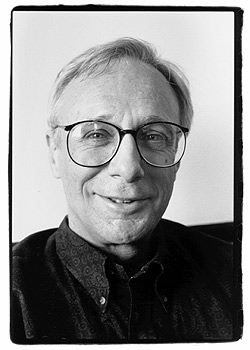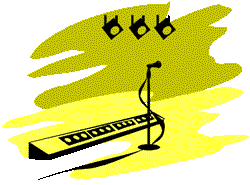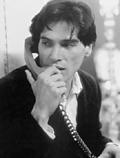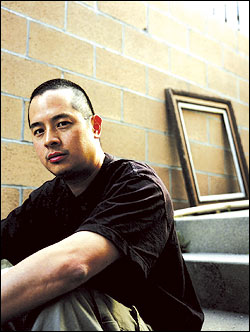Robert Christgau is the longest-running commentator on popular music in America, from his 1967–69 stint as Esquire‘s “Secular Music” columnist to his tenure at The Village Voice, where he began as a writer in 1969, inaugurating the much-imitated Consumer Guide, in which he writes capsule reviews of new albums and letter-grades them. Apart from two years spent at Long Island’s Newsday, he’s been at the Voice ever since. He’s issued three books of Consumer Guides (for the ’70s, ’80s, and ’90s), as well as a pair of essential essay collections, 1973’s Any Old Way You Choose It and 1998’s Grown Up All Wrong.
Christgau was the keynote speaker at the inaugural EMP Pop Music Studies Conference in 2002; that speech appears in This Is Pop, a collection of the first conference’s highlights edited by EMP curator Eric Weisbard and published by Harvard last spring. He’s participated in every conference since then, including this year’s, whose topic is “Music as Masquerade: Poseurs, Playas, and Beyond.” Christgau will present his paper on ’50s R&B vocal group the Coasters, “That Is Rock & Roll, Isn’t It?: Searchin’ for the True Yakety Yak” this Saturday morning; it tackles both the group’s status as one of the era’s biggest acts (largely by lampooning racial stereotypes) and their import now, in a time when they’re barely remembered. It’s one of a promising array of presentations at this year’s conference (see sidebar below).
We talked with Christgau about the Coasters, and about the Pop Conference in general.
Seattle Weekly: Let’s start with the obvious: Why the Coasters?
Robert Christgau: There’s a list in the back of Grown Up All Wrong of how this [book] isn’t my pantheon and there’s a bunch of artists who, if it were my pantheon, there’d be essays on. The Coasters are one of the seven or so artists I listed. They’re very, very important artists for me the way other people on that list, like Thelonious Monk and the Ramones, are—both of whom are also funny, by the way. Alone among the great figures of the ’50s, they didn’t pretend to be expressing themselves. They were basically very theatrical.
Finding stuff on the Coasters is very hard. I happen to have the long out-of-print Coasters biography on my shelves, so I read it—turns out one of them was gay, and one of them was a great com-edian. They’re all dead, except for Carl Gardner, the lead singer from the beginning till now, more than 50 years. But it’s making the job much harder—nobody has ever written anything about the Coasters. There are little paragraphs in other things [about] vocal groups or, more commonly, [Coasters producers Jerry] Lieber and [Mike] Stoller. The liner notes that [late critic] Robert Palmer wrote for 50 Coastin’ Classics, the Rhino [anthology], is easilythe best thing that’s ever been written about them, not surprisingly.
They really have sort of fallen off the map. The main reason would be a very serious bias toward undeniable prime creators in rock historiography. And even though Presley does not qualify, because he was an interpretive singer, he seems that way anyway, for understandable reasons. Jerry Lee Lewis, Little Richard, Chuck Berry—those are prime creators. The Coasters? They’re product. In some kind of way, they’re product—collaborative and calculated in a lot of different ways. I think for that reason they don’t have the same kind of greatness associated with them, because we think of greatness in those very romantic, individ-ualistic terms. I think that’s the chief reason that they don’t get what I think is their due. I was surprised to learn that [my wife] Carola’s favorite rock and roll song of the ’50s was “Searchin’,” which I did not know until we started talking about this. It was certainly in the top five or 10 for me.
Let’s talk about the Pop Conference, which you’ve been involved with since the beginning.
I think it’s the best thing that’s ever happened to serious consideration of pop music, not just in this country but, as far as I know, in the world. I mean, I know people who are resentful who probably wouldn’t say that. What did [Harvard’s] Reebee Garofolo say the first year? “The word on the street is that it’s too white.” I said to the person next to me, “What street is that? University Avenue? School Street?” There are people who’ve never come close to [the conference] who are not stupid—[Anthony] DeCurtis, who’s got his own fiefdom down at Duke. [They’ve] never wanted anything to do with EMP.
The first year, Carola came with me, armed with a complete guide to Seattle, so she could go to museums and find restaurants while I was going to boring panels. She never left the building. She had exactly the same experience that I always have at EMP, which is that whenever I get bored for a second, there’s something else I wish I was at and I go to it. Then, two years later, I brought my daughter Nina, who was then a high-school senior. We said, “There’s an amusement park there.” And she never left the building. It’s tremendously entertaining. Supposedly, this was all over her head, and I guess probably some of it was, but enough of it wasn’t.
There are two reasons for this. There are a lot of journalists talking, and journalists tend to be more entertaining than academics. The other thing is that the academics now really understand that they’d better put on a show, or they’re going to be in trouble [laughs]. They can’t get away with what they get away with in academic conferences, which is to be boring. I’m not saying every academic is boring, but every academic at this conference is aware that standards of literacy and being communicative are very high, that this is the big show. I’ve seen some dull presentations—it happens among the nonacademics, too. But because it’s a three-ring circus, there’s always something good going on.
Robert Christgau will present “The Coasters Revisited” at Experience Music Project’s JBL Theater at 10:45 a.m. Sat., April 16. $20 for full weekend pass. A full Pop Conference schedule can be found online at www.emplive.org/visit/education/popConf.asp.








